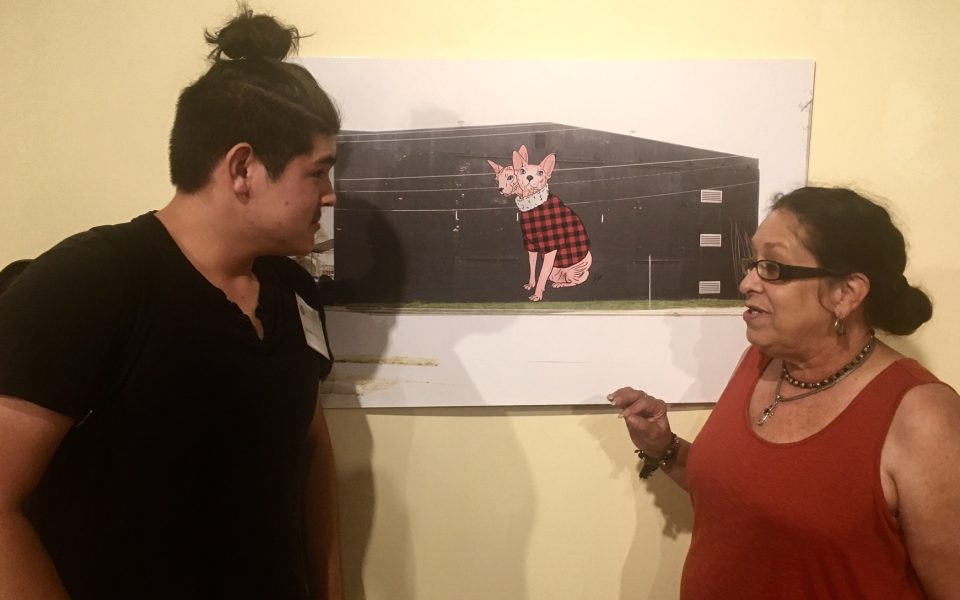by Brian Clarey
Nobody fills a doorframe like Richard Boyd, who early on the night of Feb. 27 positioned himself at the end of the long hallway that leads to the inner chamber of the Garage.
It was just after the first band’s set, a rollicking bout of electric country from Hayride Suicide that wrapped with a coda from “St. Johnny Cash.” Just an hour or so into the first night of Cash Bash, the room was at capacity. There by the door, Boyd could deliver the bad news personally.
It was his 13th such production, an annual tribute to the Man in Black that’s been running about as long as the Garage itself. It endures, in part, because of Boyd’s singular dedication to the cause — you can hear Cash in his voice when his band the bo stevens plays the stage, with a little Elvis thrown in. And it has lasted, too, because of the nearly universal appeal of Johnny Cash, who in death it seems has eclipsed all of his peers from the old Sun Records days in Memphis — even King Elvis himself.
Cash’s place on the Tree of Rock branches out near the base of the trunk, when rock, blues and country had yet to fully separate into their respective camps. His career began in the 1950s; he performed and recorded more or less continually until his death in 2003 and influenced artists in every single decade. His antiwar stance and dedication to social justice earned him respect within the 1960s counterculture, while his songs set the template for the 1970s Nashville music machine. Punk bands admired his ethos and his wardrobe. Artists ranging from Justin Timberlake to Trent Reznor have admitted a debt to his influence.
The crowd at the first night of Cash Bash testified to the diversity of Cash’s reach: cowboy hats and baseball caps, leather jackets and porkpie hats, mustaches both ironic and earnest and sweater moms you suspect might have joints tucked somewhere in their purses.
The first night of the weekender centered on Cash’s legacy in the country-music idiom, featuring a slate of troubadours offering variations on the theme he pioneered back in the ’50s: standup bass, quick-fingered guitar and sledgehammer drums. Hayride Suicide played it straight, hitting just the right notes on “Cry, Cry, Cry.” The next act, the Mystery Hillbillies, traded on the world-wise rasp of frontwoman Michelle Belanger and the lode of country music mined by the likes of Tanya Tucker.
The third act, Sarah Shook & the Disarmers, embraced the gothic darkness that is a part of Cash’s persona. Sipping neat whiskey on stage, Shook launched her four-piece into a cover of “There You Go” which she transcribed into a minor key, adding a postmodern eeriness to the old chestnut and giving her guitarist, a gunslinger from the Brian Setzer school of rockabilly by the name of Eric Peterson, cause to throw down.
Boyd and the bo stevens channeled a less jaded Cash, wending through gospel and honky-tonk numbers, a few from the Carter Family catalog and Elvis-like croonings before calling all their people onstage for a group rendition of “Ring of Fire,” and none of that mariachi crap either — this was a rollicking electric interpretation that could easily have served as the apogee of the evening were it not for John Howie Jr. & the Rosewood Bluff, charged with closing out the first night.
Howie is the stuff of modern Nashville nightmare, with thin ginger muttonchops, a grin that could pacify a mule and the kind of off-kilter genius that gave birth to the lyric, “I got tiny white blisters on my throat.”
That’s not the sort of product that comes out of the country-music machine these days, an apparatus that, it should be noted, Cash helped build.
But Boyd’s annual tribute underscores the fact that Cash’s legacy does not lay strictly in the province of country music; it belongs to us all.
Join the First Amendment Society, a membership that goes directly to funding TCB‘s newsroom.
We believe that reporting can save the world.
The TCB First Amendment Society recognizes the vital role of a free, unfettered press with a bundling of local experiences designed to build community, and unique engagements with our newsroom that will help you understand, and shape, local journalism’s critical role in uplifting the people in our cities.
All revenue goes directly into the newsroom as reporters’ salaries and freelance commissions.


“There by the door, Boyd could deliver the bad news personally.”
What bad news?
That the show was sold out.
The Dollar General has a guy that size, for customers like the one who claimed all his “hard-earned money” wasn’t deserved! of the Dollar General, or whatever it was I decided to stay out of by pretending to focus on Chester Cheetah.